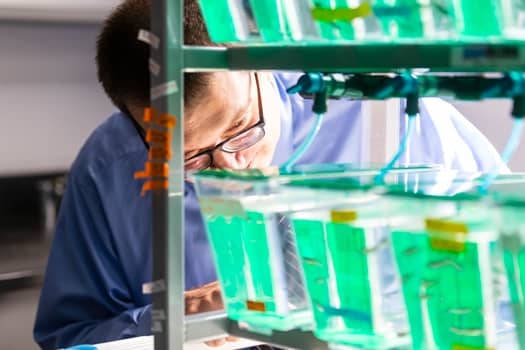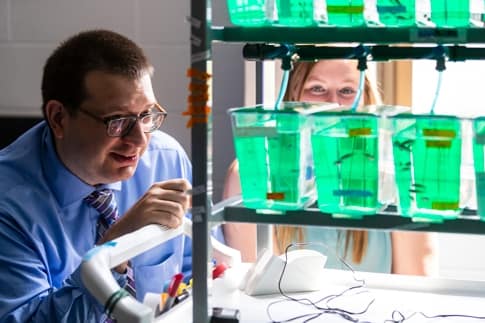Enlarge

Photo by: Jeremy Enlow
Through a 2021 Council for Christian Colleges and Universities grant, Dr. Andrew Holowiecki, assistant professor of biology at Abilene Christian University, and his team of undergraduate researchers are studying the embryonic development of zebrafish in hopes of better understanding human development.
ACU was one of nine CCCU institutions awarded a grant and has received $133,427 in the last two years. With the funding, Holowiecki has been able to advance his research and further understand the similarities and differences between zebrafish and human development. The zebrafish is a powerful model organism – a non-human species that allows scientists to study biological processes. In this case, Holowiecki is asking and answering questions about vertebrate development.
“Zebrafish embryos are small and develop rapidly,” Holowiecki said. “Within 24 hours of fertilization you can visualize a beating heart and circulating blood cells under a standard laboratory microscope. These qualities, and the highly similar DNA they share with humans, have made the zebrafish a powerful model, providing a better way to study the etiology of human congenital defects.”
Holowiecki, a first-generation college graduate, has a wealth of education in the world of biology. He received his bachelor’s and master’s degrees in biology at Bowling Green State University. From there, he earned a doctorate in molecular and cellular biology from the University of Alabama. Upon completing his doctorate, he was a postdoctoral fellow at Cincinnati Children’s Research Hospital for three years. In 2019, Holowiecki made the trek to Abilene to become an assistant professor of biology at ACU.
“It’s been great because I have all these stories about working in a lab,” Holowiecki said. “I feel like for every chapter I teach, I have a lab story that enhances the content.”
Enlarge

Photo by: Jeremy Enlow
Holowiecki’s students are able to use knowledge acquired in the classroom as they join him in the zebrafish research. Youngseo Choi, a sophomore biology major from Seongnam-Si, Korea, is one of the students working on the CCCU project, which has entailed generating mutant zebrafish using a powerful genome editing technique.
“When you’re in class, students tend to just focus on memorizing the material,” Holowiecki said. “Here, you can go out yourself and study it. It makes classes more interesting because you’re learning what’s in the book and applying it outside of class.”
Prior to working with Dr. Holowiecki, Choi did not know what zebrafish were. Dr. Joshua Brokaw, associate professor of biology, recommended she work with Dr. Holowiecki to further her expertise in biology and to enhance her future applications to medical schools.
“I’ve learned a lot from Dr. Holowiecki and tried to learn as much as possible while I am working with him,” Choi said. “He always understands me and says it’s okay that I couldn’t understand the overall research since it’s hard to know everything.”
In addition to learning common and advanced molecular laboratory techniques, Holowiecki and his students work together to maintain the zebrafish colony, which is housed in the Onstead Science Research Center. Currently, the colony consists of 13 tanks housing a variety of zebrafish strains, all of which have been provided by zebrafish researchers at Cincinnati Children’s Research Hospital and Baylor College of Medicine.
“Maintaining these relationships has been important and allows me to demonstrate the collaborative nature of science to my students,” Holowiecki said.
In the Department of Biology, students learn how to explore different areas of biology in a safe environment with emphasis on conservation, and all students present at the ACU Undergraduate Research Festival each spring.
“Science is for everyone,” Holowiecki said. “It’s knowledge about the world and we’re willing to share it.”
Learn more about the Department of Biology.
— Connor Mullins
Feb. 8, 2023
